By Molly Patrick
Oct 28, 2014,
By Molly Patrick
Oct 28, 2014,
Do you know anyone who’s had the same style for so long that it actually became cool again?
I’ve known a-plenty and I’m probably one of them in the making.
In fact, I had much love for the Fanny Pack loooong after everyone ditched theirs for something more complicated than strapping your shit around your waist and walking out the door.
It’s so easy, what’s not to love about the FP?
Apparently, a lot because everyone (apart from me) hated the fanny pack for a solid decade, until Harper’s Bazaar did a spread on “belt bags” in this month’s issue and now all of a sudden the fanny pack is BACK.
This is great for me because suddenly everyone has stopped making fun of my “burse.”
My point here is, if you’re not cool right now, just keep doing whatever you’re doing (or wearing) and allow cool to catch up to you eventually.
It’s kind of like eating oil-free.
I remember people who embraced an oil-free diet in the 90s when it was even more socially unacceptable and awkward than eating a vegetarian diet (to say nothing of a vegan diet).
Fast forward two decades and the notion of skipping oil is just now beginning to be embraced by the mainstream.
I grew up in a really small town in New Mexico and worked in an equally small food co-op on and off for 7 years beginning in 1994, starting when I was 14.
My little town wasn’t one of the cool New Mexico towns like Taos or Santa Fe.
My town had ranchers, a Wal-Mart, a few street lights, and dusty parking lots.
It did have a couple of art galleries and of course the food co-op, but even then it was sleepy at best. Silver City, New Mexico was the consolation destination if you weren’t cool enough or didn’t have enough money to live in Santa Fe. So it attracted a lot of people who were looking for a place to call home that was a little different, tucked away, and affordable.
Silver City is a unique place where hippies and ranchers collide and you can’t miss the aroma of patchouli and cow farts as you roll into town.
Spending my adolescent years at the co-op gave me plenty of opportunities to meet and interact with people who were doing things a little differently.
I met folks who were treating cancer through diet, having babies at home or in the forest without a doctor (I was in fact, one of these babies. My parents didn’t even have electricity when I popped out), lowering their cholesterol by swapping beef for tofu, dying their hair with henna to avoid the chemicals in hair dye, and of course, people keeping their weight down and their heart-healthy by avoiding oil.
There was a certain type of person who didn’t eat oil and by the time I graduated high school, I could spot this person from a mile away, through the dust, the cattle, and the art galleries selling nothing but kokopelli’s.
Let me paint a picture of the no oil eater circa 1996:
- This person was usually female and had super short hair, not because she loved the look, but because it was the easiest to maintain.
- In the summer it was Birkenstocks and in the winter it was Birkenstocks with socks.
- She was rail-thin and wore either light green or light yellow khaki-colored pants that rode high up on her waist and had either pleats, a yoke, or sometimes both.
- It didn’t matter the style of her top. It was always slightly faded from years of being hung on the clothesline in the blazing New Mexico sun and it was usually a floral print. She did not wear perfume or use anything that had a scent because she was sensitive to smells.
- She would complain about other shoppers who smelled like lotion or perfume, placing a handkerchief over her mouth and nose to avoid the smell and scolding said individuals as she walked by them.
- She did not use electronics because of the low amounts of radiation that they put off. She only shopped in the bulk section and the produce section and she thought that bread was the devil (this woman was very likely responsible for the gluten-free movement).
- The only sweetener she would use was local honey and she would pick up the store’s compost once a week for her chickens.
- This woman would always complain about something and for as healthy as she presented herself, she was unhappy and uptight.
I wanted to tell her to have a drink, get laid, eat a burger, stick some chocolate in her mouth and find some damn joy, but I didn’t dare.
Today’s no oil eater is a whole lot different.
- She’s accepted and even respected for her healthy choices. She doesn’t try to be cool, she just is.
- She’s probably a yoga teacher, her skin glows, she wears feather earrings, she most definitely makes her own nut milk, and she shines with radiance. For some reason, you just want to look at her because there seems to be an actual halo around her.
- She’s clued up about GMOs, she has a veggie garden in her backyard and she has the perfect amount of body odor. It isn’t overwhelming or disgusting. It’s subtle and sexy with a slight lavender note. She lotions up using coconut oil and she curses with just the right amount of frequency.
The no oil woman circa 2014 has come a long way.
Over the past few weeks, I’ve schooled you on fats, saturated fats, and oils and I’m confident that you understand enough about why you might want to consider eating oil-free or at least reducing the amount of oil that you include in your diet.
Just like anything new and different, it comes with a learning curve.
I was confused and hesitant at first too. Though for me, it was more about getting over the trauma of the no oil woman circa 1996 and less about not actually eating as much oil.
Today I’m laying out some super easy tricks and tips to make that learning curve a little less sweaty for you to go up. I’ll meet you at the top.
If you aren’t ready to cut the oil out completely and just want to play around with the idea, here are some basic tips to help get you started.
1. Cook more at home and buy less pre-packaged foods.
Restaurant food and packaged foods are notoriously overoiled. Do less of those things and you will automatically be eating less oil. For no oil recipe inspiration, hit up my little to no oil recipes on my blog.
2. Reduce the amount of oil that a recipe calls for.
You can do this with virtually any recipe. If it calls for 2 tablespoons, use 2 teaspoons. If it calls for 1/4 cup, use 1 tablespoon. It might take you a few tries to build up your confidence, but just take a shot at it and you’ll see how easy it is and how little it affects the finished dish.
3. Coat and wipe.
To avoid excess oil, drizzle a little oil in your pan and then take a paper towel or clean kitchen cloth and wipe off the excess, leaving just a thin coating.
If these sound good to you and you want to take it a step further, follow these tips for cooking without oil.
1. Sautéing without oil
Sautéing is a crucial step in cooking. It happens in my kitchen on the daily.
There isn’t a right or wrong way to saute veggies sans the oil, but there is one way that will taste best.
Here’s the method that will give you the most flavor with zero oil:
- Dry heat a skillet over medium heat (meaning do not add anything to the pan, not even water).
- When the pan is nice and hot, add the onion first and stir frequently until the onion starts to get brown. Add a little liquid only when the onion starts sticking to the bottom of the pan.
- If you’re not using onion, you can start with whatever veggie you like. Just make sure you don’t add the garlic until the very end or else it will burn. If you are using onion, always start with that.
- Add the rest of your veggies and continue to cook, adding a little liquid only when the veggies start to stick. The idea isn’t to simmer the veggies in liquid but to caramelize the veggies so that maximum flavor is unlocked. If you add too much liquid, you’re just simmering them and they won’t be as tasty. Cook them until you’re happy with the texture. Cook them longer for softer veggies, and shorter for more al dente.
- Add the garlic and fresh herbs last and only cook for about 30 seconds after you add them before you turn off the heat.
- At this point, adding dried spices directly to the veggies won’t be a good move because the spices will taste bitter. To avoid bitter-tasting spices you can stick with fresh herbs, or you can heat up a pan (adding no water or oil to it) and dry toast the spices for a couple of minutes over low heat.
Then you can add the dried spices to your veggies towards the end of cooking (you can toss them in along with the garlic).
Note that you can use whatever type of liquid you want in your sauté. Water, veggie stock, coconut water, beer, wine, lemon juice, lime juice, freshly juiced carrot or tomato, vinegar, Braggs, or soy sauce will get the job done.
2. Roasting / Baking without oil
Whatever it is that you’re roasting or baking (apart from baked goods), there are a couple things to keep in mind.
Use parchment paper to line your baking sheet or pan. This will keep things from sticking without the oil.
When we roast and bake things with oil, what we’re really doing is making sure that whatever we’re cooking doesn’t dry out. So instead of oil, just pour water or veggie broth over the squash, eggplant, brussels or whatever it is that you’re roasting / baking.
Keep an eye on it and if the liquid evaporates and your veggies start to dry out, just add more liquid.
Adding a fat component to your roasted veggies will help with the texture. Here is a no oil Roasted Potato recipe that is fan-fucking-tastic.
You can also slather veggies in my Lemon Tahini Dressing (AKA T-Crack) and then roast them. You will never miss the oil with this method.
3. Keep it simple and steam your veggies
Steaming is one of the fastest and easiest ways to prepare veggies. You don’t even need a veggie steamer to do it.
Here’s how.
Choose your veggies. Broccoli, cauliflower, carrots, asparagus, green beans, and zucchini are all great choices. You can also steam leafy greens but they will take a lot less time to steam, so do these in different batches or add them in at the very end.
- Place your veggies in a pan and add enough water so that 1/4 of the veggies are covered with water.
- Simmer for 5-10 minutes, depending on how soft you want them. Cook them longer for softer veggies.
- Drain the water from the veggies, season them however you’d like and serve. OR try pouring a “cheesy” sauce over them like the one from this recipe. #crazygood.
4. Baking without oil
I think that baking is sexy and people who do it well have a certain spark to them that I’m drawn to, but I myself have never been very good at it nor has it held my attention.
That said, I know that applesauce is a great substitute for oil to achieve kick-ass vegan baked yummies. Start by using half the amount of applesauce for the oil called for.
5. Try it for one week and see how you feel.
I don’t want this to be daunting for you. Thinking about doing or not doing something forever is enough to make a person RUN FAST in the other direction.
If anyone told me that I have to be a healthy vegan for the rest of my life, I would flip them off and go find cake.
I don’t even want cake, but I can’t think about not having something for the rest of my life without automatically wanting it. Do you feel me?
So here’s the plan. If you want to see how you feel without oil or any other processed food in your system, try it for a week and see how you feel. You can download a free sample Plant Fueled Meal Plan right here to help you get started.
Now, let’s not get it twisted – a no-oil diet might feel strange at first. It felt foreign to me the first week as well, but I can tell you with certainty that once you stop eating it, or even cutting it down drastically, even a little oil will feel and taste super funny and out of place in your mouth.

Ingredients
- ½ cup Kalamata olives 65g, cut into quarters
- 1 ½ cups cooked garbanzo beans 230g
- ¼ cup red onion 30g, diced
- 1 cup tomatoes 185g, diced
- 1 cup leafy greens of your choice 50g, thinly sliced. I like to use broccoli greens
- ¼ cup fresh basil 8g, sliced
- 1 teaspoon balsamic vinegar 5ml
- ½ teaspoon sea salt 4g
- 5 or so turns of freshly cracked black pepper
- Brown rice spirals
- Avocado and Walnut Parm for topping
For the Walnut Parm
- 1 cup walnuts 110g
- ¼ cup nutritional yeast 20g
- 1 teaspoon garlic 4g
- ½ teaspoon sea salt 4g
Instructions
- To successfully make this dish room temperature, even the leftovers, I want you to combine all of the ingredients except the pasta, the avocado and the walnut parm in a bowl and store it separately from the pasta.
- This way you can make as much pasta as you like and then add the yummy mixture directly to it and top it with avocado and walnut parm as you like.
- You can even make the mixture a day in advance and store it in the fridge.
- When you’re ready to eat, take the mixture out of the fridge and let it sit out while you cook the pasta. When the pasta is done cooking, drain it and then give it a quick rinse with cold water. Enough to stop it from cooking but not enough to make the pasta cold.
- Then add the mixture and stir. Put in a bowl or on a plate, top with avo and walnut parm, and bam, it’s the perfect temperature and your noodles won’t be hard and chewy.
- You will likely have leftover mixture. Here’s a pasta trick that will allow you to have lunch in under 5 minutes.
- When you cook your pasta, cook a bunch of it and store the leftovers in the fridge. When you’re ready to eat, boil some water, add the pre-cooked pasta for 30 seconds or so, until its hot.
- Drain it, add the mixture and boom – lunch in 5 minutes. Done.
Here’s how to make the Walnut Parm
- Place all of the ingredients into the food processor and process until there are no big pieces of walnuts.
- Store in a container in the fridge.
Notes
Have a beautiful week and remember, whatever problem or difficulty you’re going through at the moment will look different with time, so don’t give it too much of your beautiful attention.
MUAH!
2 Comments
Leave a Comment
Love the food that loves you back
Get instant access to thousands of plant-based recipes and meal plans, no credit card or perfection required.

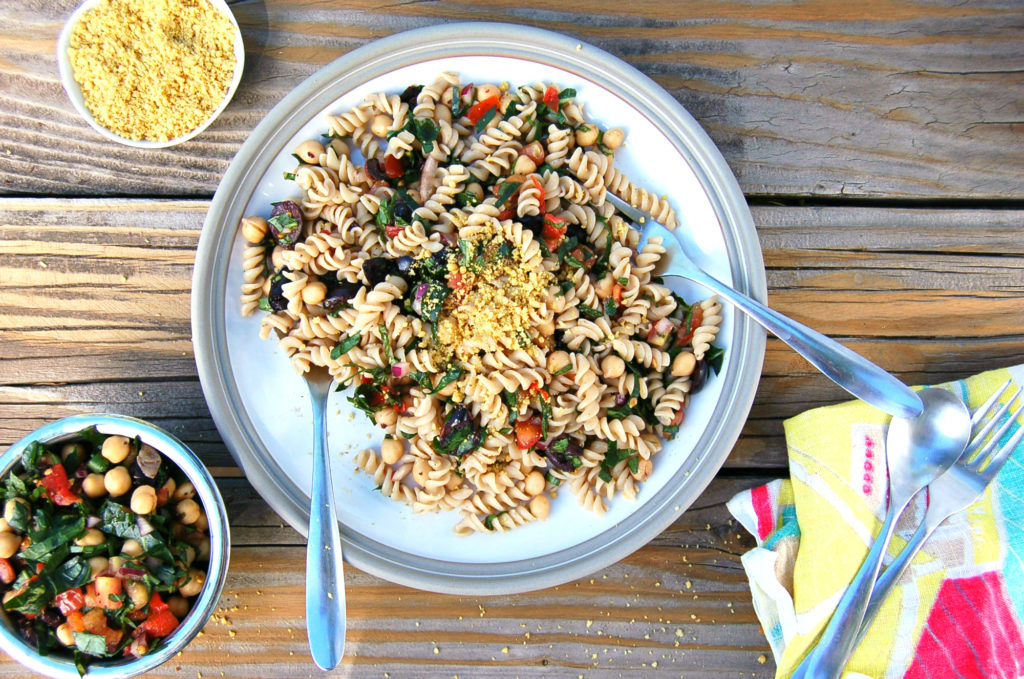
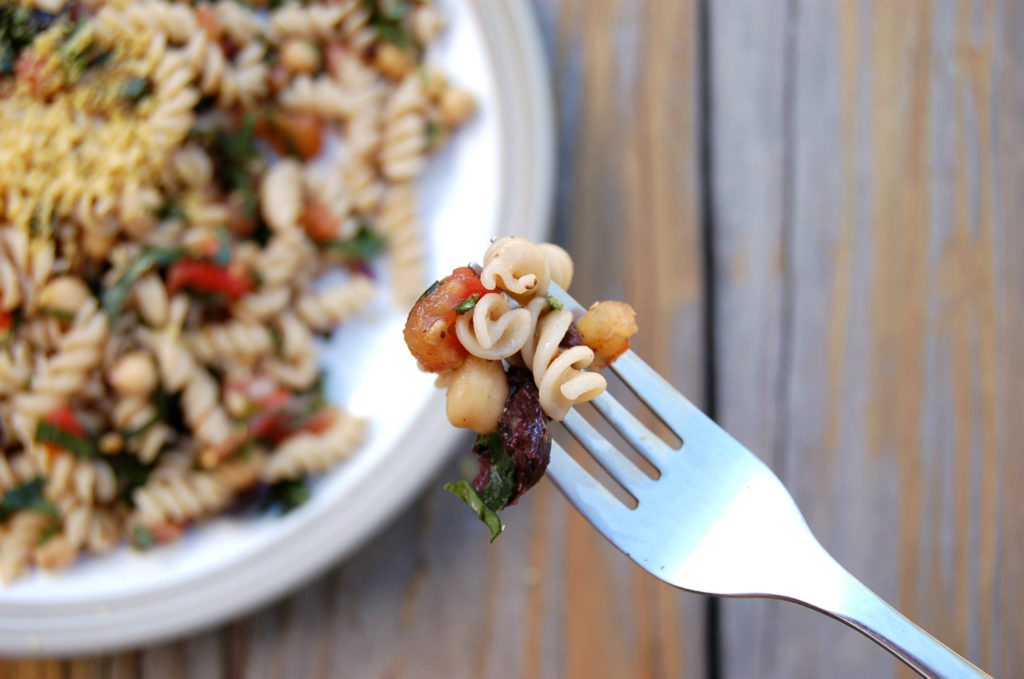
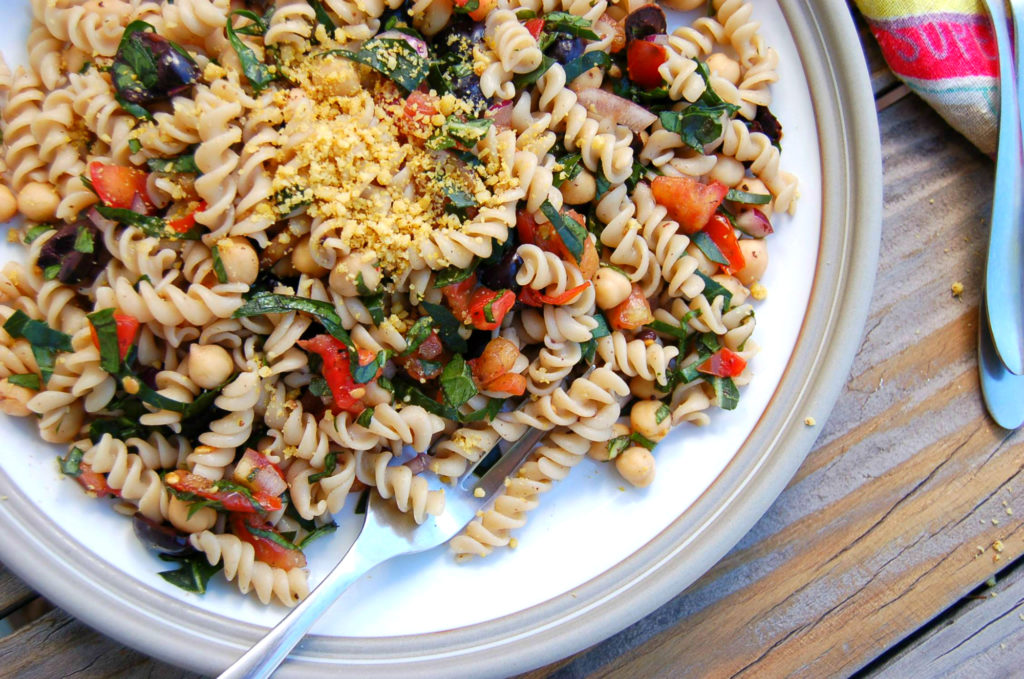


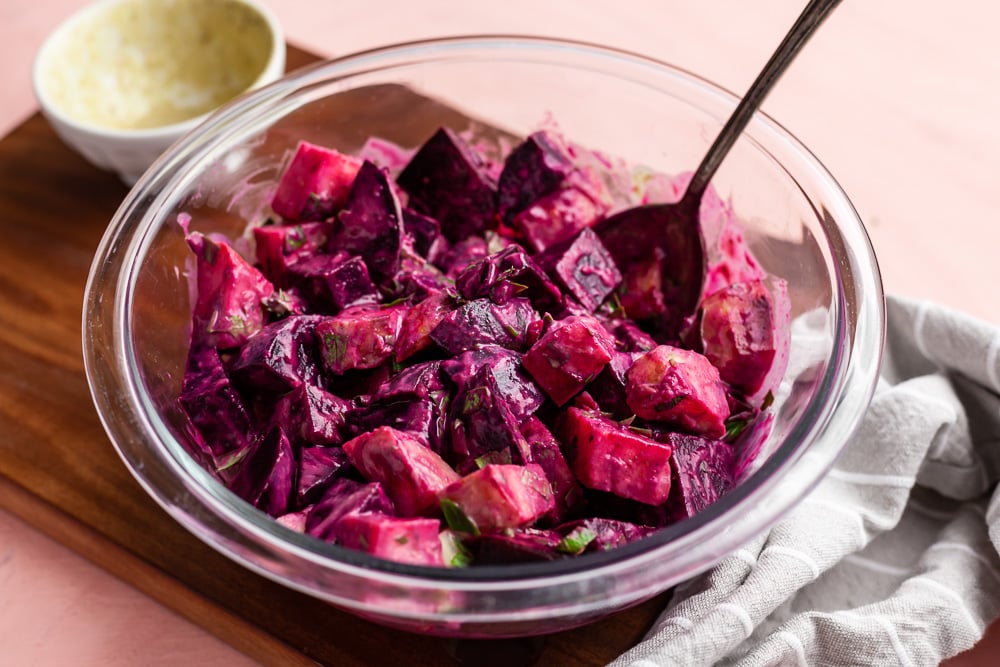


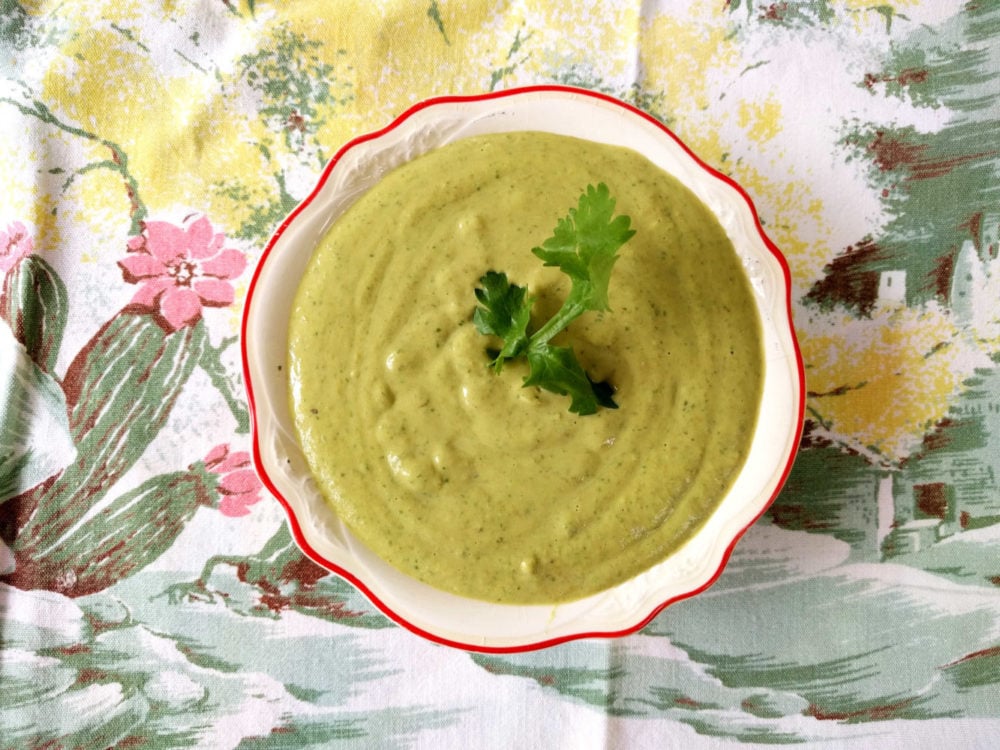
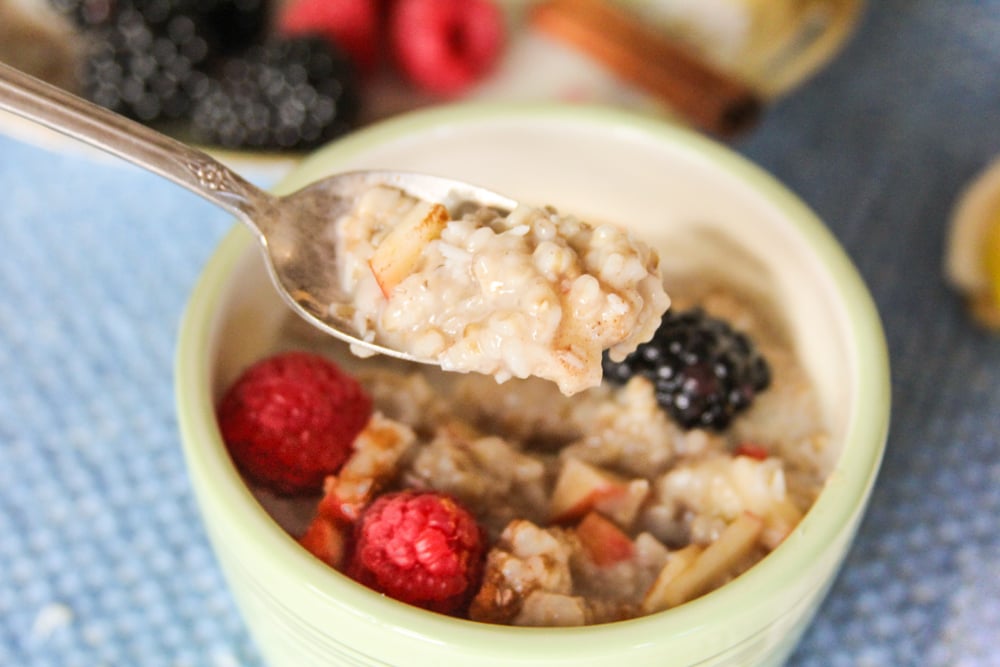
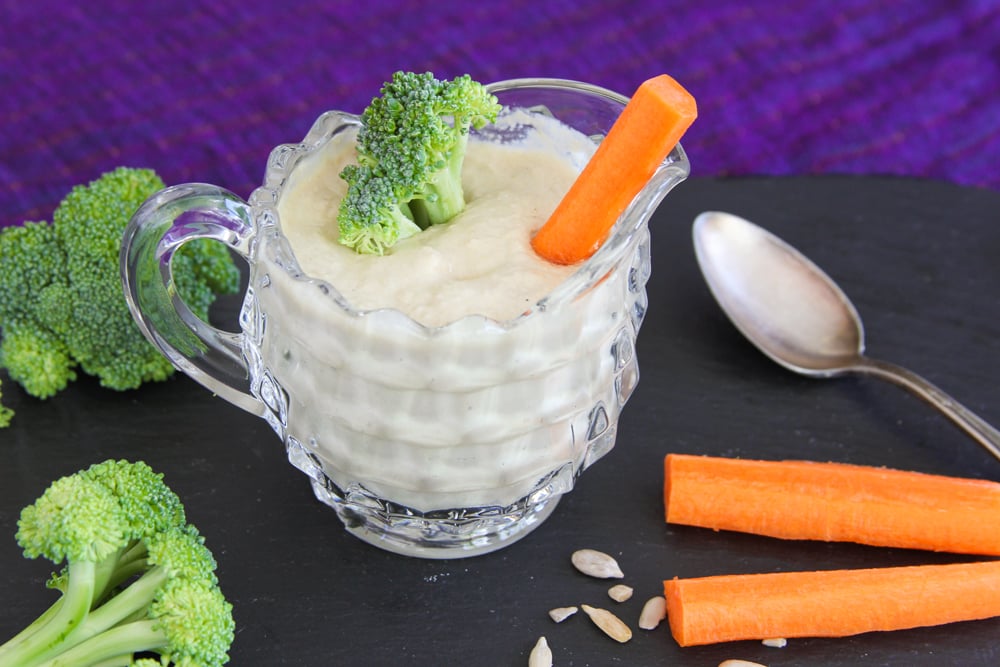
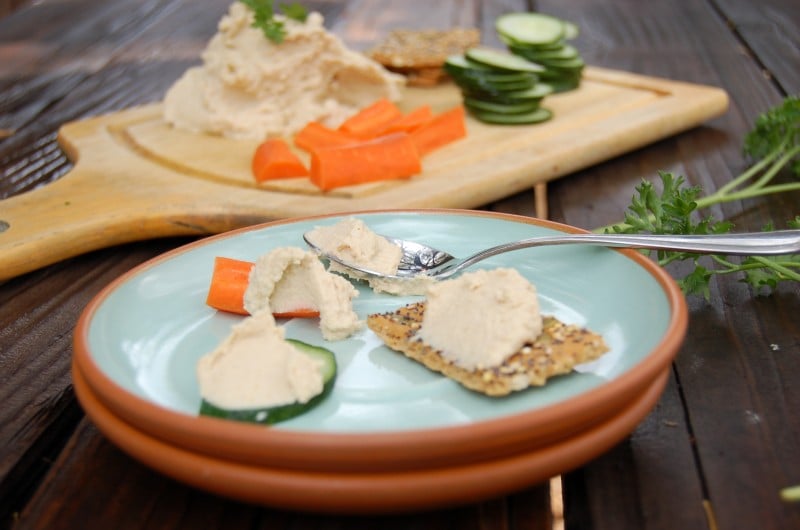
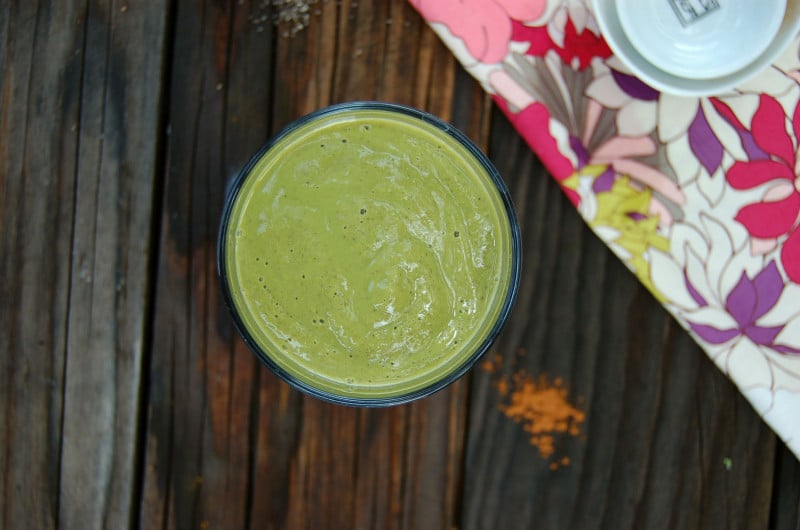




I love pasta in any form, are very easy to prepare and go almost anything.
I love garbanzo bean pasta with this recipe! Tastes delicious also!